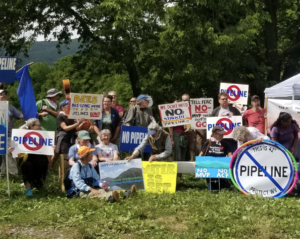
“You can just take pictures for posterity.”
That was the answer the citizens of the village of Newport, VA got when they asked how they were supposed to preserve the history of their village if the Mountain Valley Pipeline were to tear through it.
Newport is located in Giles County, a beautiful rural county nestled in the mountains straddling the New River Valley. It is the home of historic farms, bucolic covered bridges, and quaint towns. It also bears the unfortunate distinction of being the place where the Mountain Valley Pipeline is trying to cross into the state from West Virginia.
Donna Pitt of Giles County got the bad news that the impending pipeline would be routed through her property in 2014. Her initial reaction was fury. “Incredulous fury,” she says. She grew up in Rappahannock County, and was raised by parents who were ahead of their time in their practice of environmentalist principles on their family farm. Pitt immediately helped start Preserve Giles County to oppose the pipeline and the hydraulic fracking that it sustains.
Preserve Giles County is just one of several on-the-ground organizations that are part of POWHR (Protect Our Water, Heritage, and Rights), a coalition which also has a Joint Plan of Work with Virginia Organizing and which has recently gained national attention for its mobilization against Sen. Joe Manchin’s “side deal” to the Inflation Reduction Act, a deal that would have mandated the completion of the pipeline.
Preserve Giles County’s piece of the work is multifaceted, resisting the progress of the pipeline through on-site monitoring of the right-of-way, water testing, participating in legal challenges, and in everyway working to “delay, obstruct, bring suit, challenge the authority and power of [permitting agencies], and cost MVP as much as we possibly can in hopes of discouraging investors.” In other words, the pipeline resisters of Giles County are fighting like the very survival of their community and way of life is at stake.
Donna Pitt’s volunteer role with the group is about being a conduit of information and drawing together the community. The Eastern part of the county population is a mixture of farmers and academics who are connected to Virginia Tech University, located just up the road. Donna’s roots in the county along with her 30-years’ experience as Assistant to the Dean at the Virginia Maryland College of Veterinary Medicine gives her the unique ability to bridge gaps of class, politics, experience, and expertise to make the organization more effective.
For several months before the Inflation Reduction Act was passed it looked as though the MVP was dead in the water. Sen. Manchin’s side deal briefly revived it, and Preserve Giles County, along with its coalition partners in POWHR, is geared up to keep fighting any new attempts to push the pipeline through. But there will still be plenty of work to do in the event that MVP goes down in defeat. “The next step would be restoring the forest and landscape that has been damaged on the right of way, talking to lawyers to see if we can make MVP dig up what they’ve built already, and preventing other corporations from coming in behind them and buying out their rights.”
It can sound like a never-ending game of whack-a-mole, but groups like Preserve Giles County and POWHR are having an impact on how people think about energy and infrastructure. They are fighting for a future beyond an extraction-based economy, a future without sacrifice zones. That is why the people of a small rural county in the mountains of Virginia may have a tremendous impact beyond themselves, because they are not just fighting for themselves. They are fighting for the future of life itself.




